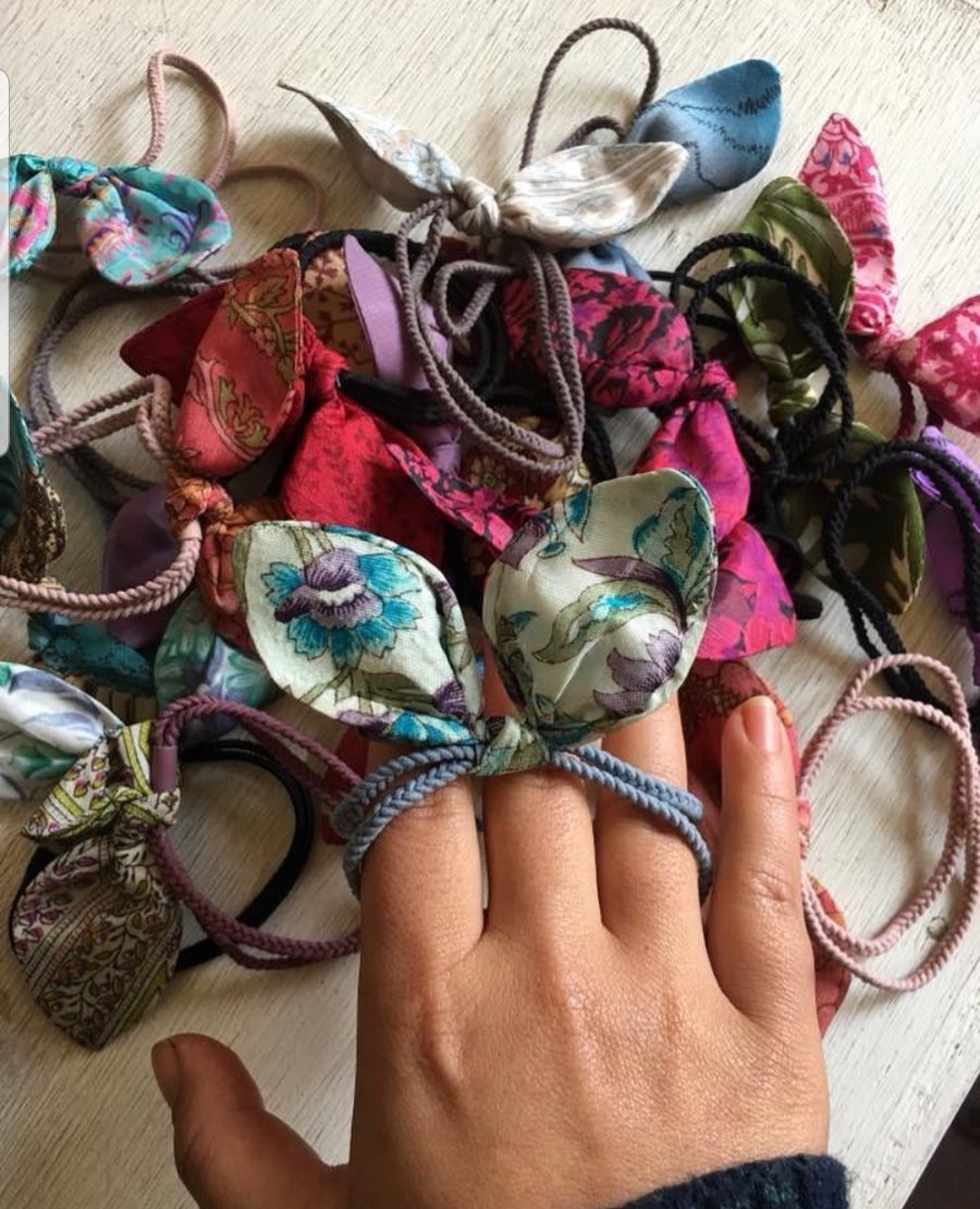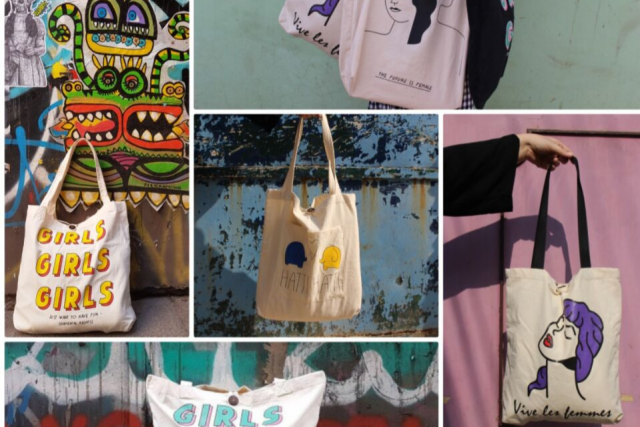Hatti, meaning elephant in Nepali, is known for its great teamwork and a big heart. Hatti Hatti is a social enterprise that serves as the best example of the way elephants work.
Founded by college friends Sunaina Singh Shrestha and Sajna Jirel, with the help of an idea from their Swedish friends- David and Charlotte, back in 2014, the enterprise works with the girls and women from marginalized communities to recycle Sarees into other products. The generated proceeds used to uplift their lives and give them the much-deserved freedom and confidence. Let’s find out what these college friends have to say about their enterprise, Hatti Hatti.
- What is the social problem you are trying to solve?
The main intention of starting this organization was to recycle clothes and to empower women from marginalized communities. The idea came to us back in 2014 when we used to sell Swedish chocolate sweets along with our Swedish friends in Farmers’ Market to generate funds for a marginalized woman. We decided to focus on recycling business and empower more women by providing the necessary skills training and employment. Since Sarees are worn by almost all Nepali women and end up either in their cupboard or in the landfill after wearing them once or twice, we thought we’d recycle Sarees. That’s basically how the venture of Hatti Hatti started.
We are an all-women organization and strive to support more marginalized women by giving them a platform where they can be themselves. We don’t just want to provide them with jobs but also to help them grow and become independent.
- Do you see any social change that Hatti Hatti has brought in society?
Yes. We’ve seen the women that choose to work with us learn, develop and grow in just a year’s time. When these women first join Hatti Hatti, they’re really shy and fear coming forward but after learning different skills, we can clearly see a change in their personalities and confidence level. From those who could not even tell their own names properly, the women turn out to be self-dependent, outspoken and bold. Another social change that Hatti Hatti has brought to the society is the reduction of Sarees ending up in landfills since they’re being recycled.
- What is the legal status of the company? How did you raise your funds to start out this venture?
Hatti Hatti is registered as a non-profit earning organization back in 2017. We made Swedish chocolate sweets and sold it in the Farmer’s Market to collect funds for the initial startup. People were enthusiastic to buy our delicacies after knowing our story of Hatti Hatti, which really helped in raising funds.
- Do you have any plans for growth for new ventures?
Yes, we plan to reach out to more marginalized women in the local hometown. It’s easy for us to bring them to the city and teach them valuable skills but if we look at it from their perspective, it’s different. They have to stay away from their family and that’s something we want to work on. So, we’re planning to go to their community and organize training workshops so that they can work while staying close to their family.
- How many employees were there when you first started out Hatti Hatti?
It was just the two of us when we started out. Currently, we take interns from Thames International College and foreign nations as well. So, 10 of us are working at Hatti Hatti including us, our team members and interns.
- Were there any challenges that you faced while starting Hatti Hatti?
Yes. Hatti Hatti is a Nepali brand but we only had support from the international market. The local market was hesitant to buy the products made from worn sarees. So, we had to carefully market ourselves and aware people about recycling in order to generate sales.
- How did you overcome your challenges?
It was a tough task changing the mindset of people to buy local made recycled goods over first hand imported products. We tried to give our products the much-required exposure regarding their value and also their inside story. We do this by attaching a number on each of our products which the customers can use to read their respective stories through our website. This way they can feel connected with the person who made the product. Accordingly, we displayed our products in various local stores such as ‘Timro Concept Store’, ‘The Local Project Nepal’ and ‘Aaji ko Pasal’ that promote local brands like ours. We were also transparent and honest to our customers about our business model.

- Can you give us an estimation of your investment to date?
Frankly speaking, there isn’t an exact investment made in Hatti Hatti. We sold Swedish chocolate sweets back in 2014 and trained the women with the earnings. Then the girls made their own products and we helped them sell those that brought in some more money. It was again used to train the marginalized girls who made products and sold them. That’s how the money kept on circulating. Furthermore, David and Charlotte also found us a market there so generating revenue wasn’t a big challenge for us.
- Who are your target customers?
Our target customers include people in the Nepali market who can buy our products and women from the marginalized community who are willing to join our organization. We do not want to be dependent on the international market and hence aren’t targeting them directly.
- How do you think is the market potential for your products?
The main motive of this organization is to empower women in marginalized communities. We have been updating our products and adding new designs too. This shows that women have been upgrading their skills to meet the market’s demands. As for market potential, the question is a bit difficult for us to answer at present but let us hope for the best.
- Is your business based on profit-making or self-sufficiency model?
Since we are registered as a non-profit organization, we look at Hatti Hatti from a social perspective. We don’t have an exact business model as of now but here’s what we do. We support marginalized girls/women and help them earn their living independently. Everyone is special in their own way and they have their own pace of learning. So even if the girls do not come up with a good product or learn skills quickly, instead of questioning their ability, we try to understand and give them the required training.
- Are there any key needs of Hatti Hatti?
Right now, we’re in need of funds to invest in the company. We have 7 marginalized women tailors working with us and we really want them to grow and help their community break their barriers and stand up for themselves. To achieve this, we definitely need funds from outside sources too.
- Do you measure the impact of your product in society?
Yes, we do. It’s not just limited to the impact our product has brought in the lives of the customers, but also the positive change in our girls. We are in the process of measuring this dual impact.
- Do you consider yourself as a social entrepreneur?
Well, we are still learning. Every day working with our girls and discovering new things has been of great pleasure but we cannot say that we are professional social entrepreneurs yet. Let us hope this journey will succeed and we will be able to call ourselves social entrepreneurs in the future.
- Is there anything else that you would like to share with people?
Yes! Support us, support us and support us!
If you would like to know more about this organization then connect with them on Facebook or check out their website Hatti Hatti.
by blincventures.com







